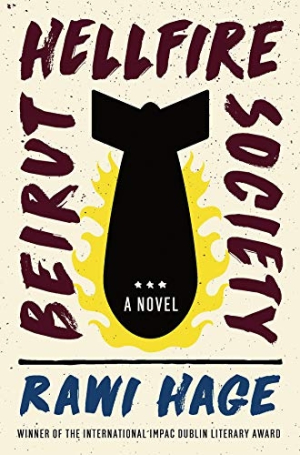
Beirut Hellfire Society
Rawi Hage’s novel Beirut Hellfire Society is an intimate glimpse at the effects of civil war that challenges social and religious norms.
Pavlov is the son of an undertaker in war-stricken 1970s Beirut. An avid reader of the Greeks, both mythological and philosophical, he inherits the family business after his father’s violent death. When the mysterious El-Marquis pays him a visit, Pavlov learns of his father’s connection to the Hellfire Society, a libertine group opposed to conventional religious moralism. Pavlov’s father provided cremation services to the dead deemed outside of moral bounds and thus denied burial rites. Now Pavlov must carry on these duties, navigating the horrors of war and his own bleak outlook all the while.
The narrative pulls no punches in depicting the violence and depravity that war births, and cynicism runs throughout. There are gnostic undertones in the philosophy of Pavlov’s father, particularly in relation to his distaste for the earthly interments that the church insists upon. Instead, he says, the dead should be set free by fire.
Within the violence are more meditative moments. Pavlov gradually emerges from his introverted and antisocial shell, moving from a person who believes dogs to be better company than humans to someone who is genuinely concerned about the welfare and safety of his sister’s family. His interactions with his niece are a relief from the dark hopelessness that pervades much of the narrative.
At times brutally intense, Beirut Hellfire Society unsettles detached views of war. There are, it insists, real and horrible consequences of wars that cannot be ignored, forgotten, or romanticized. Here, escape into perceived comforts and safety is not an option.
Reviewed by
Meagan Logsdon
Disclosure: This article is not an endorsement, but a review. The publisher of this book provided free copies of the book to have their book reviewed by a professional reviewer. No fee was paid by the publisher for this review. Foreword Reviews only recommends books that we love. Foreword Magazine, Inc. is disclosing this in accordance with the Federal Trade Commission’s 16 CFR, Part 255.
